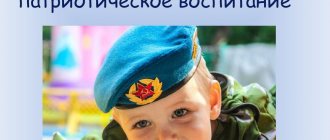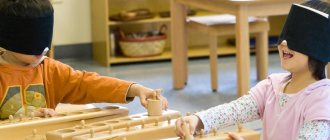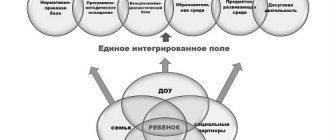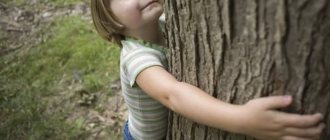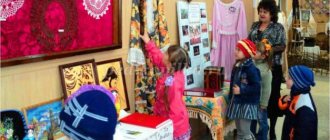Contents of work on the regional component of OOP DO
The priority areas of work for preschool groups of the MDOU Child Development Center - Kindergarten No. 41 in Sochi are:
- study and maximum use of the favorable climatic, natural and cultural features of the southern region when carrying out sports, health, educational and educational work, development of physical qualities through preschool tourist training, participation of older preschoolers in the sports life of the city, in regional, city, all-Russian competitions, competitions, festivals, promotions; organization of intellectual, emotional and physical activity as the optimal option for moral, patriotic and spiritual education of preschool children
The work program includes a regional component in all types of children's activities:
- by means of using regional, municipal programs, authorized programs and the work experience of teachers of preschool educational institutions of the city of Sochi in familiarizing children with the national and cultural characteristics of the Krasnodar Territory, city, district and the formation of spiritual and moral culture;
— through the study and maximum use of the favorable climatic, natural and cultural features of the southern region when carrying out physical education, recreational and educational work
The implementation of the regional component is carried out in senior groups in educational activities in special moments
The regional component provides:
- building a program on local (Krasnodar Territory, Sochi, districts of Sochi) material with the aim of instilling respect for one’s small homeland;
- introducing the child to the national cultural heritage: folk arts and crafts, national cultural traditions, works of local writers, poets, composers, artists. Children, together with adults, learn the traditions and customs of the peoples of Sochi. Get acquainted with the geographical features of the city, with the sights of the city and regions;
- development of physical qualities through preschool tourism training. Children of senior preschool age participate in the sports life of the city, in regional, city, all-Russian competitions, competitions, festivals, and promotions.
The educational process is carried out according to the author’s programs “Composition studies for kids”, “Preschool tourist training” ( review by the director of the Center for Youth and Education R.R. Iskakov, Deputy Director for Water Resources Ya.A. Kukav, veteran of Kuban tourism, full member of the Geographical Society of Russia, winner of the Semenov-Tianshansky silver medal, laureate of the 1st city competition of author's programs E. N. Gavrilyuk)
The purpose of program implementation is a process that involves:
Organization of intellectual, emotional and physical activity as the optimal option for moral, patriotic and spiritual education of preschool children
– using the example of the immediate natural and social environment to familiarize preschoolers with the world around them, to help them understand their place in it through tourism and local history activities
In this regard, the main tasks are:
In the field of education:
— expansion and deepening of students’ knowledge of local history, city attractions, social skills;
— acquisition of skills and abilities in working with the map;
— acquisition of special knowledge on issues of tourism and local history activities, provision of first aid;
— development of the child’s intellect, formation of visual and figurative thinking, improvement of the qualities of spiritual, moral, patriotic education of the younger generation;
— acquaintance with the problems of ecology and nature conservation, protection of historical and cultural monuments.
In the field of education:
the formation of a spiritual and moral attitude and a sense of belonging to one’s home, family, kindergarten, city;
the formation of a spiritual and moral attitude and a sense of belonging to the cultural heritage of one’s people;
the formation of a spiritual and moral attitude towards the nature of the native land and a sense of belonging to it;
nurturing love, respect for one’s nation, understanding one’s national characteristics, self-esteem as a representative of one’s people, and a tolerant attitude towards representatives of other nationalities (peers and their parents, neighbors and other people.)
In the field of physical training:
- physical improvement of preschool children - development of strength, endurance, coordination of movements in accordance with their age and physical capabilities;
promote physical development and health
- fulfillment of the relevant standards during the academic year, participation in tourism and orienteering competitions within the city, participation in hikes, including multi-day ones)
- learn to navigate the natural and social environment.
These tasks are solved in all types of children's activities: in classes, in games, in work, in everyday life - as they instill in the child not only patriotic feelings, but also form his relationships with adults and peers. Thus, when solving the problems of moral and patriotic education, each teacher must build his work in accordance with local conditions and characteristics of children, taking into account the following principles:
“positive centrism” (selection of knowledge that is most relevant for a child of a given age);
continuity and succession of the pedagogical process;
a differentiated approach to each child, maximum consideration of his psychological characteristics, capabilities and interests;
a rational combination of different types of activities, an age-appropriate balance of intellectual, emotional and motor stress;
an activity-based approach that develops the nature of learning based on children's activity.
The national-cultural component is implemented by topic and makes up 20% of the main general education program of preschool education at the child development center - kindergarten No. 41 in Sochi:
The thematic program plan includes the following topics:
Geographical characteristics:
— Introductory lesson - what is interesting about local history travel (introduction to the course of study); what and how they will do, watching videos, photographs, slides about the activities of the Caucasian Geographical Society, about the history of the city, its districts, about flora and fauna, etc...) Districts of Greater Sochi. Climate in Sochi. Population of the city of Sochi. Sochi City is a resort and the capital of the Winter Olympic Games.
— Scheme map of the city of Sochi (study of topographical signs, depiction of the relief and its elements on schematic maps, topographic maps, reading maps and working with them; using a compass on hikes; participation in qualifying orienteering competitions). Rivers and mountains in Sochi, lakes, waterfalls, caves of Sochi. Settlements. Sights of Sochi and its regions.
— Relief of Sochi and rocks.
Characteristics of relief and rocks (study of relief and rocks at field events, museum pedagogy)
— History of Khosta and Sochi
Acquaintance with the historical events of the region and city, where the names Khosta, Sochi, Kudepsta, Matsesta came from. Legends. Sochi and Sochi residents during the Great Patriotic War. Organization and holding of anniversary events dedicated to Victory Day. Sights of Khosta and Sochi. Visiting attractions - excursion sites and museums with the involvement of parents. Participation in the military-patriotic game “Zarnitsa”, competitions “I am a Sochi resident!”, “Sochi and Sochi residents during the Second World War”, participation in the “Tuning Fork” song festivals, ethnic festivals, holding folk and Cossack holidays Vvedensky fairs, Christmas, Maslenitsa , Easter, etc. Meetings with famous residents of Khosta and Sochi. Staging performances and theatrical games aimed at historical events.) Business events
Our region
Familiarization with the Krasnodar region. What is the Krasnodar region famous for? City and coat of arms of Sochi, Krasnodar; participation in city local history competitions, excursions, promotions, creating an album and photo exhibition about your favorite city; problems of protecting and preserving natural unity in recreation and tourism areas, etc. Staging performances based on legends, “My native land, beloved land”, “We live in Kuban”.
- My family and clan.
Family presentation. Family tree. Creation of a personal album “Me and my family”. Traditions of the peoples who inhabited Khosta and Sochi. Traditional Russian religions. Meetings with representatives of the Orthodox Church. Tales of peoples. Folklore. Theatrical performances. Participation in family festivals, fairs and competitions. Excursions to ethnic museums and temples. Visiting families by families with the aim of introducing family traditions.
Black Sea.
Geographical characteristics. Riches of the Black Sea. Legends of the Black Sea. Flora and fauna of the Black Sea. Environmental problems of the Black Sea.
Participation in the city competition “Black Sea”. Celebrating Black Sea Day. Staging performances and theatrical games. Charity events.
Flora of Sochi.
— Features of the vegetation of Sochi. Plants are exotic. Plants are relics. Tiers of the forest. Plants are endemic. Poisonous and dangerous plants. Medicinal plants. The ability to distinguish between medicinal and poisonous plants and mushrooms of the Sochi region in the herbarium, in drawings, and on walks and trips; “Green Pharmacy” - the use of medicinal and edible plants, etc. Visit to the Museum of Nature, Arboretum Park, “Southern Cultures” Photo exhibition. Staging performances and theatrical games. Planting trees on the territory of preschool educational institutions and courtyards.
- Animal world.
Features of the animal world of Sochi. What animals can be found in the forest. Visit to the Museum of Nature and the Laura Aviary Complex, Aquariums, and Dolphinarium. Protected animals. Photo exhibition. Meetings with representatives of the Reserve and the “Refuge”. Participation in promotions and competitions. Staging performances and theatrical games. Business events to protect nature.
Protection of Nature
- Protection of Nature. Ecology and nature conservation. Protected nature - Red Book of the Krasnodar Territory and Sochi. Rules of behavior in nature. Helping nature. Environmental actions. Participation in competitions “Bird Day”, “Earth Day”, “Water Day”, “I am a researcher”, “Black Sea Day”, March of Parks, “Our Home is the Earth”, etc. Staging performances and theatrical games.
— Study and protection of historical, cultural, and natural monuments.
— Acquaintance with the monuments to the partisans, “Eternal Flame”, “Feat of Mercy”, Stele, Matsesta, Anchor - Cannon, N. Ostrovsky, Lighthouse, People's House, Library named after. Pushkin, yew-boxwood grove, etc. Laying flowers, participating in security measures with the involvement of parents. Photo exhibition and exhibition of drawings. Meetings with WWII veterans and local historians, residents of Khosta and Sochi. Staging performances and theatrical games aimed at historical events.
— Museum pedagogy.
Creating a mini-museum in a preschool institution. Collection of exhibits with the participation of parents and conversations in the mini-museum on the topics “History of Khosta”, “My city is the best!”, “People’s life”, “Natural resources of Sochi”, “Sochi and Sochi residents during the Second World War”, “Sochi - hospital city", "Sochi Olympic". Compilation of stories about the city, region, region. Excursions to museums of history, local history, sports glory, Cossacks, nature museums with the participation of parents. Photo exhibitions. An art gallery on the theme of a mini-museum.
Repetition of material.
— Repetition of topics at competitions, quizzes, environmental holidays. Participation in the family festival “My city is the best!”, “Let’s join hands, friends!”
Based on the goals and objectives formulated in the program, the following methods and forms of work are used:
— Joint activities with children: direct educational and educational activities in restricted moments;
— Independent activities with children;
— Interaction with the families of pupils to implement the tasks of the national-cultural component;
— creation of a subject-development environment for the implementation of assigned tasks
— search and research method (independent work of children performing various tasks on excursions and hikes),
- a method of self-realization through various creative activities, participation in competitions, hikes, excursions;
— control method: medical, self-control, quality control of program mastery, growth in the dynamics of sports performance;
- a method of an integrated approach to education and upbringing, presupposing the unity of moral, physical, aesthetic and other forms of education.
forms can be used : various games (sports relay races to overcome obstacles - “tourist strip”, role-playing orienteering games “Find the Treasure”, “Orienteering by Legend”, etc.), quizzes, competitions, holding health days , sightseeing trips, weekend hikes.
Forms and types of control : contests, quizzes, games, competitions.
Intermediate results of mastering thematic blocks
6 years
Curious, active
Asks exploratory questions. Interested in new unknowns in the world around him. Names and shows the city of Sochi, the Black Sea on the map, notes their uniqueness, names the qualities of sea water (clean, salty, transparent, healing).
Names by presentation or with the help of pictures some of the inhabitants of the Black Sea. Guess and compose descriptive riddles about objects and objects of nature. Recognizes and names endemic plants in pictures, primroses, plants listed in the Red Book.
Emotionally responsive
Expresses delight, surprise, admiration when studying the inhabitants of the sea. Expresses positive feelings when viewing the nature of the city of Sochi in albums, when viewing slides, and videos. Responds to the emotions of loved ones and friends, empathizes with the characters of legends, stories, stories. Reacts emotionally to works of fine art, music and art, and the natural world. He motivates his attitude towards the Khostinsky district, the city of Sochi, and the Black Sea.
Mastered the means of communication and ways of interacting with adults and peers
Composes simple stories about the flora and fauna of Sochi and the Black Sea. The child adequately uses verbal and nonverbal means of communication, has dialogical speech and constructive ways of interacting with children. Composes simple stories using illustrations.
Able to solve intellectual and personal problems appropriate for age
Establishes connections between flora and fauna (forest tiers) using a visual model. Conducts experiments with sea and river water. The child is able to propose his own idea and translate it into a drawing, construction, or story.
Having primary ideas about oneself, family, society, the world and nature
The child has an idea of the flora and fauna of the Black Sea, the city of Sochi, water and air temperature; honorary residents of Sochi, parents' professions.
Having mastered the universal prerequisites for educational activities/
Independently follows step-by-step instructions from an adult and, if in difficulty, seeks help from an adult.
Final results of mastering thematic blocks
7 years
Curious, active
Asks exploratory questions. Interested in new unknowns in the world around him. Names and shows the city of Sochi, the Black Sea on the map, notes their uniqueness
(the sea is two-layered, the lower layer is saturated with hydrogen sulfide, the upper layer is saturated with oxygen; the city of Sochi is protected from strong winds by mountains and a warm sea, the Winter Olympic Games will be held here), names the qualities of sea water (clean, salty, transparent, healing, stormy, calm) .
Names by presentation or with the help of pictures some of the inhabitants of the Black Sea. Guess and compose descriptive riddles about objects and objects of nature. Recognizes in pictures and names endemic plants, relict plants, primroses, plants listed in the Red Book. Participates in environmental events, city and all-Russian competitions and competitions, festivals, hiking trips, summer camps.
Emotionally responsive
Shows a steady interest in understanding the unique ecosystem of the city of Sochi and the Black Sea. Knows poems, legends about the sights of Sochi, about the inhabitants of the sea. Respects the work of adults of different professions in nature conservation.
Together with adults, she performs accessible environmental tasks.
Responds to the emotions of loved ones and friends, empathizes with the characters of legends, stories, stories. Motivates his attitude towards the city and its regions.
Mastered the means of communication and ways of interacting with adults and peers
Reflects knowledge about the city of Sochi, the inhabitants of the Black Sea in small coherent stories, in expressive, musical and theatrical activities.
Composes simple stories using illustrations.
Able to solve intellectual and personal tasks appropriate for age
Establishes connections between flora and fauna (forest tiers) using a visual model. Conducts experiments with sea and river water.
The child is able to propose his own idea and translate it into a drawing, construction, or story.
Has primary ideas about himself, family, society, and nature
The child has an idea of life in the Black Sea and knows its inhabitants. Has an idea of the sights of Sochi and its regions, and together with his parents participates in environmental events, city and all-Russian competitions and competitions, festivals, hiking trips, and summer camps.
Having mastered the universal prerequisites of educational activities, he is able to model the “floors” (layers) of the water of the Black Sea, the flora and fauna of Sochi and place plants and animals on them, according to their way of life.
Can make simple “discoveries” in the process of learning about the flora and fauna of his native city, region, and sea. Independently follows step-by-step instructions from an adult and, if in difficulty, seeks help from an adult.
Predicted results:
— students’ acquisition of knowledge about the criteria for a healthy lifestyle;
— formation of a child’s positive attitude towards a healthy lifestyle and active recreation;
— children’s acquisition of experience of independent social action.
By the end of training, students should know:
— criteria for a healthy lifestyle;
— name of the region and regional center;
— what is the Krasnodar region famous for;
- the name of the city you live in, the name of the districts,
- attractions: railway and sea, bus stations, St. Michael the Archangel Cathedral, Festival Hall, Winter Theatre, Art Museum, Central Children's and Youth Theatre, circus, stadium, parks "Arboretum", "Riviera", "Southern Cultures", monument "Anchor- cannon, “Feat of Mercy” stele;
- the name of the area in which you live, its streets, attractions of the area, microdistrict;
— rules for arranging a bivouac (find comfortable and safe places to stay overnight away from villages, where it is more convenient to put up a tent, where to make a fire, is there firewood and water);
— a variety of travel conditions (roads, forests, uneven terrain – descent, ascent);
— topographical signs: highway, path, garden, buildings, mountain pass, tall grass, well, hole, impassable swamp, river, barbed wire, cliff, pile of stones, river, spring, lake, bush, meadow;
— safety requirements while hiking, safety rules on the street; fire safety, road and transport safety; safety on water and in nature;
— features of the flora and fauna of the city;
be able to:
— distinguish and build a fire (taiga, well, star, hut, signal);
- master hiking techniques (descent, uphill, bumps, pendulum, log, parallel and suspended crossing);
- freely set up and assemble the tent;
- choose healthy foods;
- self-service on a hike, at a tourist rally;
- follow the rules of hygiene for young tourists;
— navigate unfamiliar terrain using a map;
- use a first aid kit (iodine, brilliant green, bandage, painkiller, adhesive plaster);
- use 3-5 medicinal plants as needed;
- comply with the general rules and obligations of the hike participant;
— distribute responsibilities in the group (detachment commander, deputy, supply manager, medic, commandant, photographer, fireman, responsible for equipment)
- show personal responsibility for the work started, the word given;
— conduct simple research to develop mini projects.
The conditions for the implementation of these tasks are:
— the presence of qualified teachers of additional education who have the title “Instructor of children’s and youth tourism” or “Organizer of tourism and local history work”;
— relationship between theory and practical work;
— availability of a sufficient amount of camping equipment.
The idea of a small homeland is a meaningful basis for the implementation of a variety of children's activities. Therefore, this content can be successfully integrated with almost all educational areas and consists of the following:
Inclusion of regional material in the educational areas of the Program implemented in preschool educational institutions, integration of the regional component into the educational process:
| Educational area | Methodical techniques |
| Cognition | Introducing preschool children to nature:
Getting to know the world around you:
Getting to know the past of your native land:
|
| Artistic creativity |
|
| Reading fiction |
|
| Communication |
|
| Physical Culture |
|
| Music |
|
Distribution of the educational load of the variable part of the pre-school educational program
| Implementation of educational activities | 4-5 years | 5-6 years | 6-7 years | |||
| Qty | time | Qty | time | Qty | time | |
| Tourist and local history orientation | ||||||
| "Composition for kids" | — | — | 1 | 30 | — | — |
| "Pre-school tourist training" | — | — | — | — | 1 | 30 |
| Total for variable part (per week) | — | — | 1 | 30 min | 1 | 30 min |
Enriching the educational environment
In order for the process of introducing children to the origins of national and regional culture to be carried out successfully, it is necessary that the entire macro and micro environment surrounding the child in kindergarten be meaningful - informative, attractive and accessible.
In the halls and corridors there are thematic stands “My village, my land, my Russia”, “Bread land”, containing information about the native land, and in groups about the native village and its features.
Mini-exhibitions, consultations, round tables, regional and regional events organized in preschool institutions are of great informational importance. Each group has a local history corner and collected material for working with children. The group teachers approached the creation of corners creatively.
